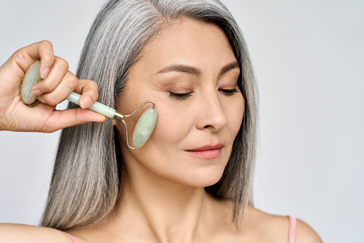Why Do We Need Five Types of Collagen, and What Are the Best Sources?
Posted by Mike Miryala on

Collagen is currently making lots of waves in the world of wellness. Many people are already taking advantage of collagen supplements for smooth skin, stronger nails, and shinier hair. Also, this protein has been shown to improve digestion and support overall health.
That being said, collagen is commonly seen in supplement form as Type I, II, III, IV, and V. These collagen types have been proven to support different functions in the body. For example, the type I is beneficial for tensile strength, and the type II is great for stretching in multiple directions (organs, ligaments),
However, most anecdotal data has shown that humans benefit from multi-collagen containing the 5 types.
You might wonder, “Why do I need five types of collagen?” Well, in this article, we shall take you through the five common types of collagen, their key functions, their best sources, as well as why you need them. But before then, let’s get to the basics.
You can check out this delicious collagen treat loaded with the best collagen types - Indulgence Chocolate Collagen.
What is Collagen?
Collagen is the most abundant protein found in mammals. In fact, it makes up one third of all the proteins present in the human body.
This protein is found in almost all connective tissues and structures of the body, including skin, muscles, cartilage – and the list goes on.
In the human body, there are 28 different types of collagen present, but five types – Type I, Type II, Type III, Type IV, and Type V are commonly used in supplements.
These five types come from different sources and they are in different forms. This makes them unique in their actions and potential benefits.
The synthesis of collagen happens constantly in your body, and it is kick-started by a unique combination of amino acids: mainly proline and glycine.
However, as you grow older, your body starts producing less and less collagen. This is a natural phenomenon and it often leads to signs of aging, including wrinkles, saggy skin, fine lines, and more. More so, lower levels of collagen production in the body causes weaker cartilages, bones, and other important structural body parts. That’s where collagen supplements come into play.
Each collagen supplement contains a varied combination of the different types of collagen. But as more and more collagen gets introduced into the market, it is important that you understand the different types of collagen, their sources, and potential health benefits.
This way, you’ll be able to understand the benefits you stand to gain from a particular collagen supplement.
Without further ado, let’s dive into it!
What are the types of collagen?
As we’ve mentioned earlier there are 28 known collagen types, but we will be focusing on the five most important types:
Type I collagen
The type I collagen makes up to 90% of your body’s collagen. These collagen fibers are abundant in the skin, bones, blood vessels, and the connective tissues.
Studies have shown that type I collagen is found in scar tissue as it aids in blood clotting and wound healing.
However, type I collagen is notable for its anti-aging properties. This fibrous protein has been shown to help reduce skin wrinkling and improve the overall health of the skin.
What are the best sources of type I collagen?
Type I collagen is present in high amounts in;
- Egg whites
- Fish collagen
- Bovine collagen peptides
- Bone broth
- Protein-rich foods, like beef and fish
Type II collagen
Type II collagen mainly supports joint health. It is found in more elastic cartilages than the type I and II collagen.
Studies have shown that the type II collagen is beneficial for patients with rheumatoid arthritis.
Interestingly, of all the collagen supplements, type II has been shown to be well tolerated by the digestive system than other collagen types when taken orally.
What are the best sources of type II collagen?
Type II collagen is present in high amounts in;
- Bone broth
- Multi-collagen protein powder
- Protein-rich foods, such as chicken
Type III collagen
Type III collagen makes up the structural part of muscles, blood vessels and organs. This collagen type is the second most prevalent after type I.
Studies have shown that type III collagen is abundant in the intestines and aids in intestinal health.
Since this collagen type makes up a large part of muscles, taking type III collagen supplements help in building muscle mass and enhancing exercise performance. You can also include this collagen in your weight loss plan.
However, a deficiency in type III collagen may cause your blood vessels to rupture. Studies have shown patients who died of a specific type of aneurysm due to type III deficiency.
What are the best sources of type III collagen?
Type III collagen is present in high amounts in;
- Bone broth
- Egg white
- Bovine collagen peptides
- Collagen protein powder
- Protein-rich foods, like fish and beef
Type IV collagen
Type IV collagen exists naturally as building blocks in different skin layers surrounding the muscles, fat cells, and organs. However, this collagen type lacks glycine, a common amino acid present in most other collagens. This makes the type IV collagen form in sheets instead of the usual tight helix structure.
That being said, type IV collagen forms basal lamina – the scientific name for a deep layer of the skin. The basal lamina represents the upper parts of the basement membrane – a part where the outer skin layer meets the inner layers of the body.
Apart from being a building block for skin layers, type IV collagen is thought to be of importance for embryo formation and wound healing.
Studies have linked a drop in type IV collagen level with digestive disorders. However, more studies are still ongoing to determine the benefits of type IV collagen for digestive upset.
What are the best sources of type IV collagen?
Type III collagen is present in high amounts in;
- Protein-rich foods
- Egg Whites
Type V collagen
This fiber-like collagen is found in layers of the skin and hair and present in high amounts in the tissues of the placenta.
Since the placenta is important for supplying oxygen and nutrients to growing embryos, taking type V collagen is considered a good way to support neonatal development.
Another part where type V collagen is found is the cornea of the eyes. You stand the risk of an impaired vision if you suffer deficiency of type V collagen. This is due to decreased transparency in the cornea of the eyes.
What are the best sources of type V collagen?
Type III collagen is present in high amounts in;
- Egg whites
- Multi-level collagen protein powder
What are the best types of collagen to take?”
The truth is that all collagen types support the body in one way or the other. In fact, each collagen type works in unique ways to support bodily functions and processes.
However, type I and type II collagen are broadly researched to offer numerous health benefits.
Type 1 collagen, for example, is the most abundant collagen found in the body and it is useful for skin hydration, anti-aging, reduction of stretch marks, wound healing, moderate weight loss.
Type 2 collagen supports bone and joint health, and it is widely researched to help alleviate arthritis.
Closing Remark
You actually need the five types of collagen and you can enjoy a good amount of these collagen types from the sources stated under each collagen type.
Cobionic offers you the best natural wellness products and our Indulgence Chocolate Collagen helps to achieve stronger joints and hairs, lift dark sports, reduce wrinkles and other signs of aging.

Mike Miryala, Head Pharmacist at CoBionic
You may also like:
Indulgence Vanilla Collagen
- A Delicious Vanilla Treat Loaded With Collagen and 5 other Powerful Superfoods like Silica and Glucomannan
- Reduces wrinkles and fine lines
- Supports stronger, fuller hair
- Great for both gut and joint health
YouthBoost Hair & Skin Gummies
- Deliciously sweet melt-in-your-mouth gummies that are vegetarian, gluten-free, & low in sugar to deliver vitamins and nutrients
- Supports fuller, longer, more vibrant hair
- Contains vitamins that keep skin youthful and firm
- Packed with nutrients that maintain healthy, strong, growing nails








